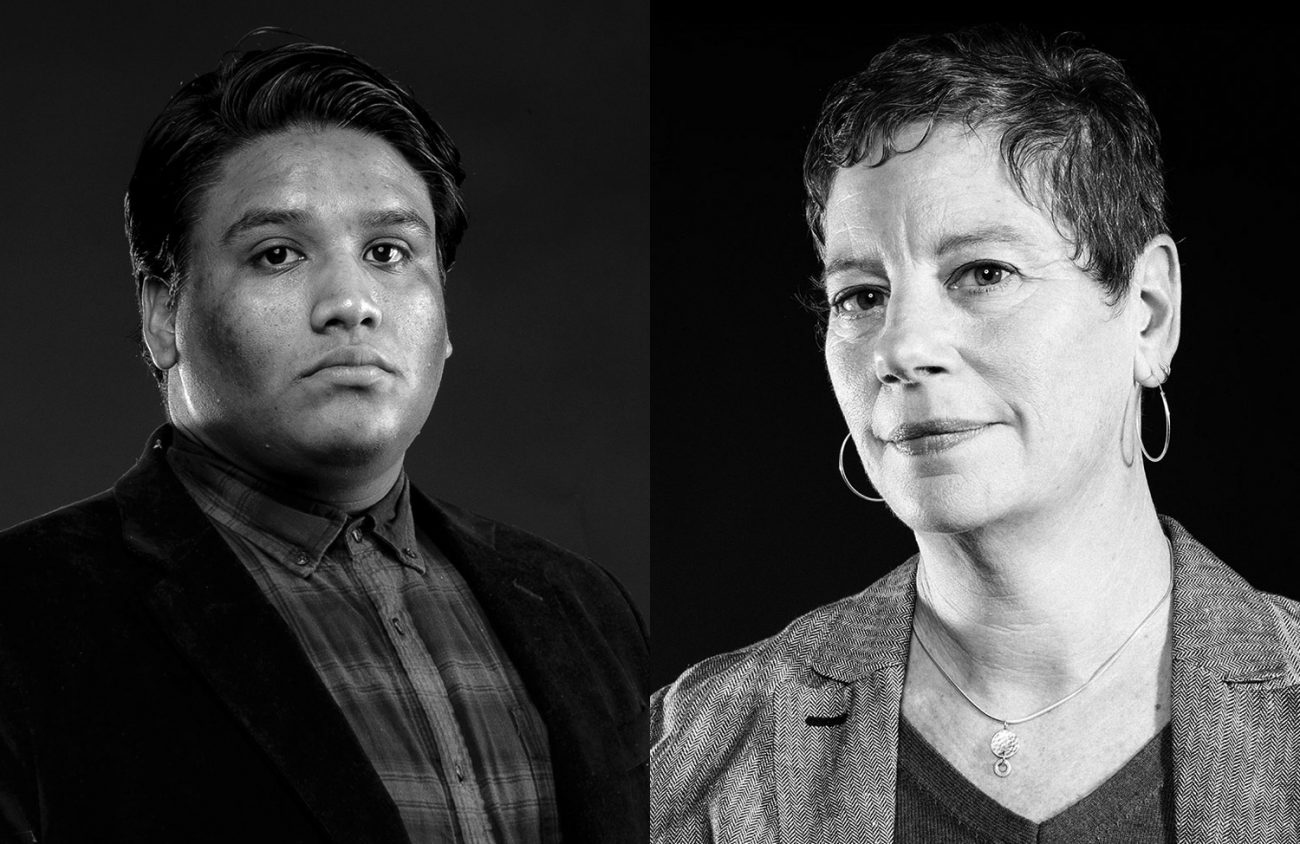After six terms, Commissioner Pete Sorenson decided to wrap up his time on the Lane County Board of County Commissioners. Five candidates ran for his South Eugene seat in May, but now the November runoff election is down to Joel Iboa and Laurie Trieger.
Both candidates have views that align with one of the two current historic moments in the U.S.: COVID-19 and race. In the midst of a pandemic, Trieger says she offers a public health framework that would inform her governing.
Iboa, a community organizer, says he has the perspective of being a person of color and wants to move past the commission’s history of “fence sitting.” He says he wants to take action to counter the region’s history of racism and offer more comfort and safety to people of color in the community.
Trieger says she started her activism at 18 years old when she was a clinic escort in Philadelphia, walking women through hostile crowds so they could access abortion services. From there, she says she’s waited tables, worked in the nonprofit sector and relied on WIC as a young parent. She’s also led campaigns to eliminate payday predatory loans and establish sick leave. In running for the county commission, she says she wants to find “her last job” where she can combine her lived experience with her career.
Trieger has said that if elected she wants to apply a public health framework. That means relying on data and evidence-based outcomes to make decisions. And when collaborating with commissioners who have a different perspective and ideology, she says she has a history of starting with the end of what they want to achieve and building out from there.
“If you start with something you agree on, then you might differ on how you get there, but at least you start on agreement on not clashing heads,” she adds.
But she says she won’t debate on whether climate change is real — because the science is settled on that.
County commissioners also serve on the board of directors of Homes for Good, the county’s housing authority. Trieger says housing inventory in Lane County is behind where it needs to be. “Affordability becomes something way beyond subsidized federal-funded low-income housing,” she says.
And finding money isn’t the solution for solving homelessness, Trieger says. “We’ve had this problem for a long time,” she adds. “And it’s going to get worse because of COVID, because of the sheer number of people displaced from wildfires.”
She says if everyone had a home, homelessness would still be a problem because there needs to be more money for mental health and addiction services, and workers need a living wage.
“We have to do better with providing fundamental sanitation and other ways to keep people having as much dignity as possible while they’re sleeping rough,” she says. “It really is an untenable humanitarian crisis.”
She adds that a conversation needs to happen on finding shelter sites, like building a low-barrier shelter the “community so desperately needs.”
Trieger has outraised Iboa by more than three times, pulling in $104,875 since March 2019. Her average contribution is $227 and her largest donation is $7,500, from Lane County Employees Organization. According to OreStar filings, Iboa has raised nearly $37,000 for his campaign since September 2019. His average contribution is $148 and his highest donation is $1,000, coming from Lourdes Sanchez, a Eugene immigration lawyer.
Trieger, as the union-backed candidate, has received donations from various donors — from unions to elected officials. But she’s also received $1,000 from developer Ed King, of King Estate, who has invested in the TV Butte quarry in Oakridge.
King has donated to others on the board, but Trieger says he donated to her because they’ve worked on food security issues in the past, and his quarry interests wouldn’t change her values of environment over industry.
Born in Eugene to immigrant parents, Iboa is the coalition manager for Causa Oregon, an immigrant rights organization. In 2018 he organized against Measure 105, which would have repealed Oregon’s sanctuary status. He’s also the chair of Eugene’s Human Rights Commission and is on the governor’s Environmental Justice Task Force.
Iboa says he wrote the HRC’s white supremacy condemnation back in 2019, which, he adds, spurred the county commission to take action. But he says he was disappointed in the board’s resolution, as well as the one on Black Lives Matter, because there wasn’t specific action.
“As county commissioner, one of the first things I’d like to do is have conversations on dismantling and avoid having people who align with white supremacists’ values in county government,” he says.
He says he’d want to push for mandatory training for county officials on white supremacy in Oregon and establish principles so they can’t be complicit.
He says that he’s been disappointed at the county level that officials haven’t come to terms with the reality that Oregon was founded as a whites-only state, and many people of color don’t feel safe in the community.
“For too long I’ve seen elected officials rely on the Equity and Access Board or the Human Rights Commission or advocates like myself to be presented with solutions,” he says. “I’ve rarely seen them come up with their own.”
Iboa adds he’s excited to transition from activism to decisionmaker.
Before President Donald Trump told Proud Boys to “stand back and stand by,” Oregon was already dealing with growing tensions between BLM-related protests and white supremacists. If elected, Iboa says he won’t sit on fences like some commissioners have.
“I’m one of the few people in the state who understands the depth of what we’re facing and how sinister it is,” Iboa says of white supremacy. “We have to fight back and continue to fight for democratic principles.” ν
